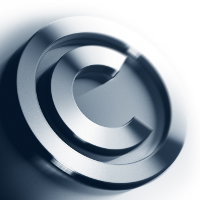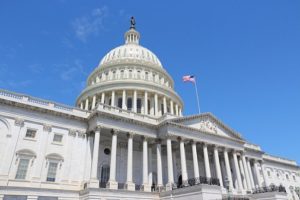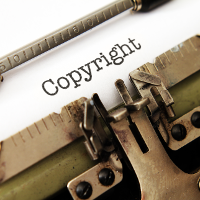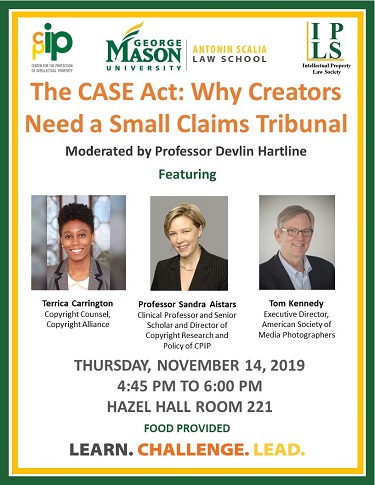The following post comes from Ryan Reynolds, a 3L at Scalia Law and Research Assistant at CPIP.
 By Ryan Reynolds
By Ryan Reynolds
The phrase “creators have rights, but no remedies” is likely familiar to those aware of the current landscape of copyright protection for individual creators and small businesses (“Creators”). While the Copyright Act of 1976 grants a bundle of rights to Creators for the protection of their works, for years Creators have faced an uphill battle enforcing those rights against infringers. There are many who are optimistic, however, that things might soon change with the passage of “The Copyright Alternative in Small-Claims Enforcement Act of 2020” (CASE Act).
Signed into law as part of H.R. 133, the Consolidated Appropriations Act, [for Fiscal Year] 2021 (“CAA”), the CASE Act creates a Copyright Claims Board (“CCB”) within the Copyright Office to handle small copyright claims (small only in the sense of their relatively modest economic value). As there is some time before the CCB comes into operation, the earliest being December 21, 2021, and the latest June 2022, now is a good time to provide an overview of just what the CASE Act does. Before venturing fully into the mechanics of the CASE Act, however, it is important to first highlight why its supporters felt it was needed.
Why Is It Needed?
Copyright cases are almost exclusively an area of federal jurisdiction, meaning that copyright infringement cases must be brought in a federal rather than state court; however, litigating a copyright infringement case in federal court is anything but easy. First, the average cost of litigating a copyright infringement claim has been estimated at $397,000—a cost that often greatly outweighs any potential recovery for Creators’ works. It is for this reason that many attorneys are simply unwilling to take Creators’ copyright infringement cases, leaving many Creators feeling disenfranchised.
Second, the complexity of the federal court system is often overwhelming for Creators. As stated in the Copyright Office’s 2013 Copyright Small Claims report, “Small copyright owners, who frequently lack experience with federal courts, often find federal litigation too difficult . . . and may be unable to navigate ‘the often complex procedural rules that govern federal litigation . . . .’” As highlighted in the report, even the Copyright Act’s registration requirement—the gateway requirement to launch a copyright infringement claim—can be problematic for Creators. It requires that a copyright owner successfully register, or receive a rejection of registration, from the Copyright Office before launching an infringement claim. Moreover, for a Creator to qualify for statutory damages and attorney’s fees, the Copyright Act requires the registration of the work within three months of its publication, or if unpublished, before the act of infringement. The failure to register within the required time is critical, as without the potential recovery of statutory damages (which can range up to $150,000 per work infringed), a Creator’s recovery would not likely overcome the legal fees incurred litigating the case.
As stated in the report, the result of this cost and complexity is that “federal court is effectively inaccessible to copyright owners seeking redress for claims of relatively low economic value, especially individual creators who are of limited resources.” Enter the CASE Act, which aims to create a less expensive and less procedurally complex alternative to the current system by creating the CCB within the Copyright Office. But how will the CCB operate?
How Will It Operate?
When the CCB becomes operational, a party will have the choice of commencing a copyright infringement proceeding in either federal court or the CCB. In contrast to federal court, and as will be discussed in more detail later, proceedings in the CCB are completely voluntary. Another way in which the CCB differs from federal court is in its authority over copyright infringement claims only where the total damages sought do not exceed $30,000. As to the CCB’s structure, it will be composed of three full-time Copyright Claims Officers. Each of the Officers must have seven years of legal experience; two of them must also have extensive copyright adjudication experience, while one must have extensive alternative dispute resolution experience. The Librarian of Congress will appoint these Officers to staggered six-year terms, and they will be supported by at least two full-time Copyright Claims Attorneys with at least three years of experience.
To make the CCB more accessible to Creators, the CCB’s proceedings aim to be more streamlined and user friendly than federal courts. A proceeding before the CCB begins when the claimant files a claim to the CCB that includes the proper filing fee and a statement of the material facts. In contrast to federal court, the CASE Act only requires a completed application for registration of the claimant’s work(s), rather than a certificate of registration or refusal of registration by the Copyright Office to commence the claim. After the claim is approved for compliance with the law and applicable regulations by a Copyright Claims Attorney, the claimant has 90 days to complete service. After receiving service, the respondent then has 60 days to opt out of the proceeding before it becomes “active”; however, in the “interests of justice,” the CCB can extend this window another 60 days.
The user-friendly goal of the CCB is best exhibited by the Act’s requirement that the proceedings take place solely “by means of written submissions, hearings, and conferences carried out through internet-based applications.” The only exception to this convenience is when there is “material” “physical or other nontestimonial evidence” that otherwise the CCB cannot review. Further, proceedings before the CCB will be more informal than in federal court. There is no requirement for representation by an attorney, there is limited discovery, and the formal rules of evidence do not apply. If the parties do not settle, at the close of the proceeding the CCB must make factual findings based on the preponderance of the evidence and issue a publicly available written determination.
With regard to remedies, the CCB has the authority to award either actual damages, and the respondent’s profits, or statutory damages. If the CCB awards statutory damages, it “may not make any finding that, or consider whether, the infringement was committed willfully,” and if timely registration has been made with the Copyright Office, the CCB can award up to $15,000 for each work infringed, though this is subject to a $30,000 maximum. In an important shift from existing law, however, even if the work was not timely registered, the CCB may still award up to $7,500 for each work infringed to a maximum total of $15,000 in a single proceeding.
Within 30 days of the issuance of the final determination of the CCB, a party can request reconsideration by the CCB. After giving the other parties an opportunity to respond, the CCB may either deny the request or amend the determination. If the CCB denies the request for reconsideration, a party then has 30 days to request the Register of Copyrights to review the CCB’s determination. After giving the other parties time to respond, the Register may deny or remand the proceeding to the CCB for reconsideration. Finally, within 90 days of the final determination, or the post-determination reconsideration, a party can appeal to a U.S. District Court. It is also in federal district court where a party can seek enforcement of the CCB’s determination if the other parties to the matter refuse to abide by its determination. For a visual representation of this process, the Copyright Alliance has put together an informative flowchart.
The CASE Act requires that three years after the CCB becomes operational the Register of Copyrights make assessment of its effectiveness. While whether the CASE Act will create the change hoped for by its supporters is yet to be seen, in my view, the attention given to address the challenges to Creators is critically important.

 Here’s a brief excerpt of a post by CPIP Senior Scholar
Here’s a brief excerpt of a post by CPIP Senior Scholar 